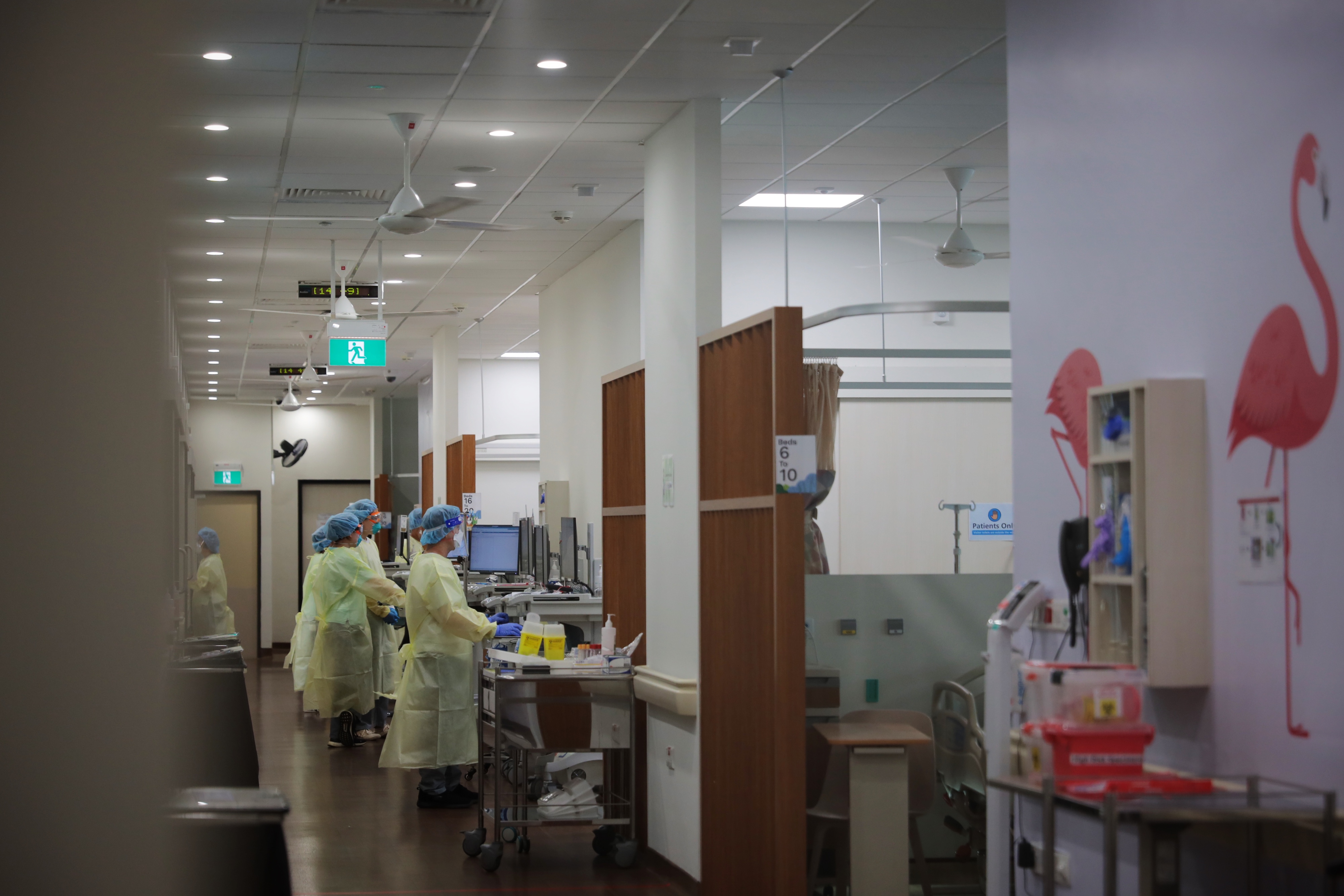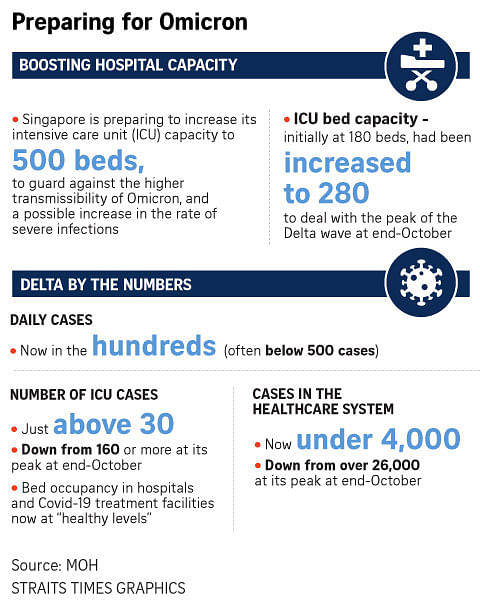Singapore prepares for Omicron wave: Plans to ramp up hospital capacity, expand role of GPs in home recovery
Sign up now: Get ST's newsletters delivered to your inbox

MOH is prepared to increase the capacity of community treatment facilities to help manage the load in public hospitals.
PHOTO: ST FILE
Follow topic:
SINGAPORE - Plans are in place to ramp up the capacity of public hospitals and intensive care units, given the higher transmissibility of the Covid-19 variant Omicron and the possibility of a surge in local cases.
Singapore’s director of medical services Kenneth Mak said intensive care unit (ICU) capacity may need to be increased to 500 beds, up from the current 280.
The capacity was increased from 180 ICU beds to 280 beds at the peak of the Delta wave in Singapore around end-October.
Explaining the need for more beds, Associate Professor Mak said the increased virulence of the Omicron variant could mean a higher rate of severe infection.
He was speaking on Tuesday (Dec 14) at a press conference held by the multi-ministry task force tackling Covid-19.
To help manage the load in public hospitals, the Ministry of Health (MOH) said in a statement that it is prepared to increase the capacity of community treatment facilities as well.
This is to facilitate direct admission or transfer of stable Covid-19 patients from public hospitals to community treatment facilities (CTFs).
"To complement these efforts, we are concurrently stepping up efforts to augment the manpower required in our hospitals and CTFs," it added.
A total of 16 cases of Omicron have been detected in Singapore to date - 14 of which were imported cases.
The two local cases were airport passenger service staff working at Changi Airport.
All are fully vaccinated, with no or mild symptoms.
Health Minister Ong Ye Kung, who thanked general practitioners (GPs) for looking after patients under the home recovery programme, said MOH is looking at how GPs can play an even bigger role in case there is a big Omicron wave.
Currently, those who feel that they are well but have a positive Covid-19 antigen rapid test (ART) result are required to stay home under the programme. They can leave home when their ART result is negative.
However, given the higher transmissibility of the Omicron variant, there will be a need to push the idea of "right-siting" even further.
Right-siting refers to treating patients in the most appropriate location by medically competent teams at the lowest possible cost.
"Today, GPs only prescribe a PCR (polymerase chain reaction) test to someone who feels unwell. Once positive, the patient will likely be put under the home recovery programme," noted Mr Ong.
However, he said GPs can be further empowered such that they can judge the disposition and the risk profile of the patient, and determine whether to do a PCR test or an ART for the patient.
For example, for very mild or asymptomatic cases, the GP may just want to do an ART.
A patient who has tested positive in this scenario may be given a few days of medical leave, and can leave home when their ART is negative.
This protocol would decentralise a system currently administered by MOH, said Mr Ong.
He added that MOH will be discussing this proposal with GPs in the coming days.

Meanwhile, the Health Ministry is trying to procure a sufficient supply of Covid-19 therapeutic drugs to reduce the risk of severe infection and protect the overall healthcare capacity.
They comprise a range of drugs including immunomodulating agents, which stimulate or suppress the immune system to help the body fight disease, and monoclonal antibodies, which are manufactured antibodies that help fight pathogens such as viruses.
The portfolio also includes antiviral drugs.
Prof Mak said: “Our plans are to ensure that we have sufficient numbers of these drugs when we need them for all our patients.
“We are reviewing whether the clinical effectiveness of our existing portfolio of therapeutic drugs is significantly compromised by the Omicron variant.”
He noted there is a possibility that some monoclonal antibodies may have reduced effectiveness when treating Covid-19 patients.
This is because of the many mutations in the S-Protein of the Omicron variant.
Prof Mak said the effectiveness of current therapeutics is a research priority in many clinical labs around the world, and Singapore scientists are looking at it as well. The findings will help determine what will work and benefit patients.
But he noted that all the other therapeutics still appear to have good effects in treating those with Omicron.
“We will adjust our procurement strategies as needed to ensure our portfolio remains clinically effective and will help to reduce the risk of morbidity and mortality in our patients,” added Prof Mak.
Correction note: This article has been edited for clarity.

